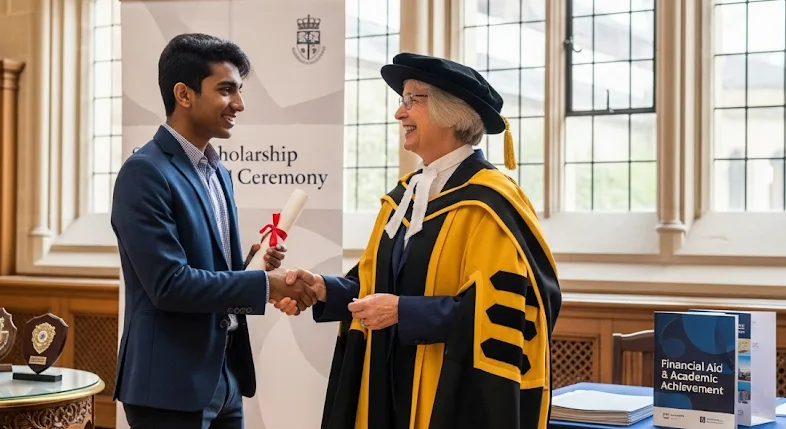
The UK remains one of the most attractive study destinations for international students, offering world-class universities, diverse cultural experiences, and globally recognised qualifications. However, the cost of tuition and living expenses can be a significant barrier. According to UKCISA (UK Council for International Student Affairs), international students often face tuition fees ranging from £10,000 to £38,000 per year, depending on the course and institution.
Thankfully, there are numerous UK scholarship opportunities designed to support talented students from around the world. These scholarships not only ease financial pressure but also provide opportunities to join a global network of future leaders and professionals. In this article, we’ll explore the best UK scholarships for international students, their eligibility criteria, benefits, and how to apply.
Why Apply for a Scholarship in the UK?
- Financial Relief: Reduce or fully cover tuition and living costs.
- Prestige: Many scholarships are highly competitive and globally respected.
- Networking Opportunities: Join alumni networks of scholars and professionals.
- Career Boost: Having a prestigious scholarship enhances employability.
- Access to Top Institutions: Gain entry to world-leading universities such as Oxford, Cambridge, and LSE.
The Best UK Scholarship Opportunities
1. Chevening Scholarships
- Provider: UK Government (Foreign, Commonwealth & Development Office).
- Level: Master’s degrees (1 year).
- Coverage: Full tuition fees, travel costs, living allowance.
- Eligibility: Open to students from over 160 countries; requires leadership potential and at least 2 years’ work experience.
- Application: Apply online through the Chevening website.
2. Commonwealth Scholarships
- Provider: UK Foreign, Commonwealth & Development Office.
- Level: Master’s and PhD.
- Coverage: Tuition fees, flights, living costs, thesis grant.
- Eligibility: Citizens of Commonwealth countries with strong academic merit and financial need.
- Application: Through national nominating agencies or directly on the Commonwealth Scholarships website.
3. Rhodes Scholarships
- Provider: Rhodes Trust, University of Oxford.
- Level: Postgraduate study at Oxford.
- Coverage: Full tuition, living stipend, travel expenses.
- Eligibility: Outstanding academic performance, leadership, and service commitment.
- Application: Apply via Rhodes Trust.
4. Gates Cambridge Scholarships
- Provider: University of Cambridge, funded by the Bill & Melinda Gates Foundation.
- Level: Postgraduate (Master’s or PhD).
- Coverage: Full tuition, maintenance allowance, airfare, visa costs.
- Eligibility: International students with exceptional academic achievement and leadership potential.
- Application: Apply via the University of Cambridge portal.
5. GREAT Scholarships
- Provider: UK Government and British Council.
- Level: Master’s programmes.
- Coverage: £10,000 towards tuition fees.
- Eligibility: Available to students from selected countries, including China, India, Malaysia, Nigeria, and others.
- Application: Apply directly through participating universities.
6. Clarendon Scholarships at the University of Oxford
- Provider: Oxford University.
- Level: Graduate degrees.
- Coverage: Full tuition fees and generous living stipend.
- Eligibility: Based on academic excellence.
- Application: Automatic consideration when applying for graduate study at Oxford.
7. Edinburgh Global Research Scholarships
- Provider: University of Edinburgh.
- Level: PhD programmes.
- Coverage: Partial tuition fee coverage.
- Eligibility: International PhD students with strong academic records.
8. University-Specific Scholarships
- Examples:
- University of Manchester Global Futures Scholarship
- King’s College London International Hardship Fund
- University of Warwick Chancellor’s International Scholarship
How to Apply for UK Scholarships
- Research Early – Applications often open 12–18 months before the start of courses.
- Check Eligibility Carefully – Requirements vary by programme and country.
- Prepare Strong Documents – Academic transcripts, references, and personal statements are essential.
- Show Leadership and Impact – Many scholarships seek candidates who contribute beyond academics.
- Apply to Multiple Options – Increase your chances by applying to several schemes.
Costs Covered by Scholarships
- Tuition Fees – Full or partial coverage.
- Living Expenses – Monthly stipends (often £1,000–£1,500).
- Travel Costs – Flights to and from the UK.
- Visa and Insurance Fees – Some scholarships cover student visa and NHS surcharges.
- Research and Study Grants – Funding for conferences, books, and projects.
Pros and Cons of UK Scholarships
Pros
- Substantial financial support.
- International recognition and prestige.
- Access to top universities.
- Networking and mentorship opportunities.
Cons
- Highly competitive selection process.
- Strict eligibility and deadlines.
- Some scholarships only cover tuition (not living costs).
Conclusion
Securing a UK scholarship as an international student can transform your academic and professional journey. With world-class programmes such as Chevening, Commonwealth, Rhodes, and Gates Cambridge, students have opportunities to access top institutions while building global networks. However, the process requires preparation, strong applications, and early planning. For those ready to invest in their future, UK scholarships offer a pathway to world-class education and lifelong opportunities.
Frequently Asked Questions (FAQ)
1. Are UK scholarships available for undergraduate students?
Yes, some universities offer merit-based and country-specific undergraduate scholarships, though most high-profile awards target postgraduate study.
2. Can I apply for more than one UK scholarship?
Yes, students often apply to multiple scholarships to maximise chances, though you may only accept one major award.
3. Do scholarships cover living costs in the UK?
Many do, especially prestigious awards like Chevening and Rhodes, but others may only cover tuition fees.
4. Is it difficult to get a UK scholarship?
Yes, competition is intense, but strong academics, leadership experience, and clear career goals improve your chances.
5. Do I need work experience to apply for a scholarship?
Some scholarships, like Chevening, require 2 years of work experience, while others, like Clarendon, focus purely on academic merit.


 Yoga and Meditation Courses in the UK: Become a Certified Instructor
Yoga and Meditation Courses in the UK: Become a Certified Instructor  First Aid Course: How to Save Lives in the UK
First Aid Course: How to Save Lives in the UK  Nutrition and Wellbeing Training in the UK: How to Help Others Live Healthier Lives
Nutrition and Wellbeing Training in the UK: How to Help Others Live Healthier Lives